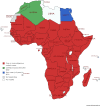Zero malaria: a mirage or reality for populations of sub-Saharan Africa in health transition
- PMID: 36333802
- PMCID: PMC9636766
- DOI: 10.1186/s12936-022-04340-1
Zero malaria: a mirage or reality for populations of sub-Saharan Africa in health transition
Abstract
The global burden of malaria continues to be a significant public health concern. Despite advances made in therapeutics for malaria, there continues to be high morbidity and mortality associated with this infectious disease. Sub-Saharan Africa continues to be the most affected by the disease, but unfortunately the region is burdened with indigent health systems. With the recent increase in lifestyle diseases, the region is currently in a health transition, complicating the situation by posing a double challenge to the already ailing health sector. In answer to the continuous challenge of malaria, the African Union has started a "zero malaria starts with me" campaign that seeks to personalize malaria prevention and bring it down to the grass-root level. This review discusses the contribution of sub-Saharan Africa, whose population is in a health transition, to malaria elimination. In addition, the review explores the challenges that health systems in these countries face, that may hinder the attainment of a zero-malaria goal.
Keywords: Health systems; Health transition; Sub-Saharan Africa; Zero malaria.
© 2022. The Author(s).
Conflict of interest statement
Authors declare that they have no competing interest.
Figures
References
-
- WHO . World malaria report 2020: 20 years of global progress and challenges. Geneva: World Health Organization; 2020.
-
- WHO . The Global Technical Strategy for Malaria 2016-2030. Geneva: World Health Organization; 2015.
Publication types
MeSH terms
LinkOut - more resources
Full Text Sources
Medical


